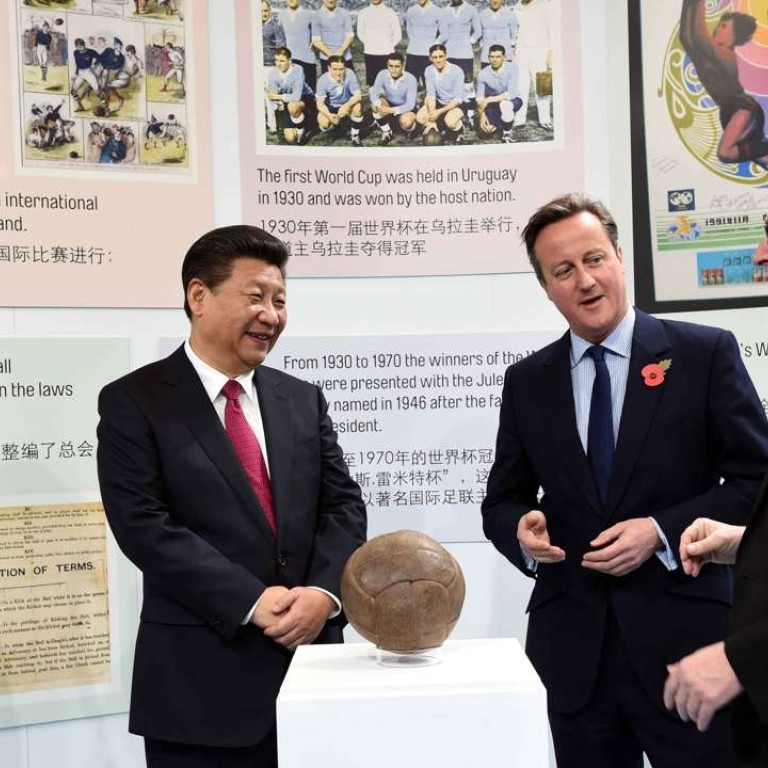
This time for real: Xi Jinping’s vision for China football has galvanised stakeholders
Unlike past attempts to lift the sport, the current drive to make the Chinese team world-class is likely to be more successful
Barely a week goes by without an announcement detailing China’s 15-year plan to become a football superpower producing world-beating players and teams to compare against the likes of Manchester United, Real Madrid, Bayern Munich, Inter Milan and Paris St-Germain.
Factories might be closing but the productivity on football pitches is about to go into overdrive.
It’s tempting to dismiss out of hand Beijing’s latest plot to corner the world’s most popular sport. We’ve heard it before.
Remember Paul Gascoigne’s miserable spell at Lanzhou’s Gansu (White Horses) Tianma FC in 2003? That was supposed to signal his post-playing career in football player/management, herald an influx of top foreign players and maintain China football’s momentum after their first World Cup showing in 2002.
Watching the English Premier League is so expensive it will destroy your wallet. Watching Chinese football is so frustrating it will destroy your life
After four games, Gazza had staggered off to rehab, Gansu White Horses were as lame as ever and Chinese football remained an embarrassment for years to come, riddled with poor players, match-fixing refs and an incompetent and corrupt CFA.
Then four years ago amid much fanfare, stroppy Frenchman Nicolas Anelka arrived at Shanghai Shenhua – a big star signing that coincided with an infusion of cash and a crackdown on bribery in football. Little came of that revamp, too.
Though cleared up in recent years, corruption still blights the mainland’s leagues and world-class talent remains elusive. The national team currently sit 81st out of 204 nations, outranked by minnow nations including Cyprus, Haiti, Panama and Benin.

So, yes, it would be easy to laugh away the lofty ambitions and diktats.
But this time around there is a reason to believe some of the grandiose policies and the vast amount of new pitches, coaches, grassroots players and money stick because far more is at stake.
Previous efforts to clean up football were doomed to failure because too many crooks had too much to lose. The leadership was indifferent to the malaise because in the grand scheme of things, being world football laughing stocks did not matter much because China were excelling in their preparation for the 2008 Olympics, a global event they went on to dominate, and the economy was purring along nicely.
China’s Super League clubs smashed signing records during the winter transfer window, surpassing the combined spend of all the clubs in Europe’s top five leagues
Now the landscape has changed. The economy is weakening and there is no showcase sporting events on the horizon to distract, save for the fringe Winter Olympics which is of curious interest at best to most Chinese.
Meanwhile, football fandom is on a growth spurt. The masses have a taste for the buzz and unity of the terraces, a weekly step outside their carefully controlled comfort zones and 90 minutes to take their minds off of the drudge of work, bills and the uncertain future.
Little wonder the rich and powerful have been ordered by a nervous Zhongnanhai to go on a spending frenzy to bring football home. China’s Super League clubs smashed signing records during the winter transfer window, surpassing the combined spend of all the clubs in Europe’s top five leagues.
The clamour to succeed is said to be down to one man’s love of the game, football-mad President Xi Jinping.

Mao believed China defeating its capitalist roadster rivals in an open sports competition would impress the masses. He also believed success would come if sheer weight of numbers were thrown at a discipline.
To surprise in the West, he decreed that table tennis would become China’s national sport. Within weeks, tables appeared in schools, all-weather tables were erected in parks and railways stations, makeshift designs were assembled in danweis/work units, villages and farmyards.
Mao believed China defeating its capitalist roadster rivals in an open sports competition would impress the masses
And so it proved. More people were playing table tennis in China by the mid-1950s than the rest of the world combined. By 1959 China celebrated their first world champion in any sport when Rong Guotuan won the World Championships in Germany.
He and his successors were paraded as “icons of revolutionary virtue” and promoted into the inner sanctum of the Communist Party to sit alongside the leader.
With resentment about endemic corruption rising and growth slowing, the government is seeking new ways to bolster itself. Once more sport is seen as the answer to show the political system knows best and can deliver a feat to wow the Chinese public and keep them onside. The cult of table tennis and Mao remain inextricably linked.
Can football and Xi share a similar fate? Few inside and outside of China will dare take their eyes off the ball.

